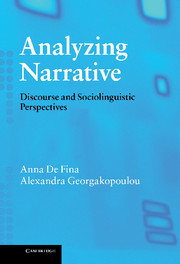Book contents
- Frontmatter
- Contents
- Acknowledgments
- Preface
- Note on transcription conventions
- 1 Narrative definitions, issues and approaches
- 2 Narrative as text and structure
- 3 Narrative and sociocultural variability
- 4 Narrative as interaction
- 5 Narrative power, authority and ownership
- 6 Narrative and identities
- Notes
- References
- Index
3 - Narrative and sociocultural variability
Published online by Cambridge University Press: 05 June 2012
- Frontmatter
- Contents
- Acknowledgments
- Preface
- Note on transcription conventions
- 1 Narrative definitions, issues and approaches
- 2 Narrative as text and structure
- 3 Narrative and sociocultural variability
- 4 Narrative as interaction
- 5 Narrative power, authority and ownership
- 6 Narrative and identities
- Notes
- References
- Index
Summary
Introduction
In Chapter 2 we discussed different approaches to structure in the study of narrative: our main focus was on the systematic description of the formal features that characterize narrative as a genre. In this chapter we shift our attention to research that centers on the relationships between narrative and context and on the embedding of narrative in social life. Our focus will be on the links between narrative form/content and culture, or cultures, and we will review work carried out mainly in the 1970s and 1980s that has set the basis for current thinking about the way narrative practices encode, reflect and shape communication patterns, ways of thinking and organizing social life in different cultural traditions. Implicit in the work that we discuss is the idea of sociocultural variability, i.e. the assumption that narrative activity and narrative genres are organized and conceived in very different ways amongst different peoples, and that stories vary in structure and content across cultures, thus reflecting the complexity of human experience.
The research developed within this general orientation to the social uses of narrative revolves around the investigation of narrative both as a contextually bound phenomenon and as a process that relates in specific ways to the life of linguistic and social communities. Unlike in theorizations about narrative structure, in the domain of narrative and culture, the boundaries between different approaches are not easily drawn. Indeed, in this case, narrative studies have been, in a sense, the by-product of more general theories about the relationship between language and social life as expressed in different schools of linguistic analysis such as the ethnography of communication (Hymes 1974) or interactional sociolinguistics (Gumperz 1982). However, in general terms the approaches and studies reviewed here can be grouped as follows:
Approaches that conceptualize the relationship between narrative and culture in terms of contexts of narrative activity
Approaches that see narrative as relating to culture through values and ideas
Approaches that focus on communicative styles
- Type
- Chapter
- Information
- Analyzing NarrativeDiscourse and Sociolinguistic Perspectives, pp. 52 - 85Publisher: Cambridge University PressPrint publication year: 2011



